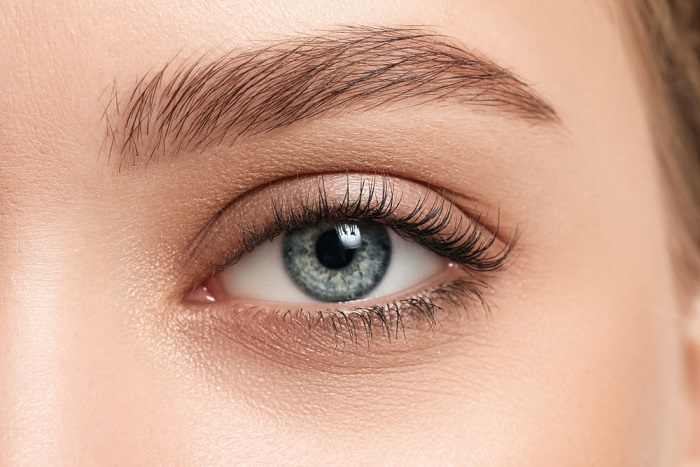
The science of beautiful skin health can be boiled down to a few key players—and the collagen level plays a starring role. A fibrous protein found in tendons, bones, and muscles, collagen is the microscopic building block that “scaffolds” the skin on a cellular level. The more collagen you have, the more supported your skin will be, helping the skin appear firm, youthful, and wrinkle-free.
Although we’re born with plenty of collagen, our body’s collagen production systems start to slow down when we reach our mid-to-late 20s. By age 40, we may lose up to 1% of our body’s total collagen every year.1
Don’t worry, you can protect the existing collagen in your skin through the use of certain supplements—and you may even be able to increase collagen production. In all, learning how to restore the skin’s collagen can help boost your beauty from the inside out.
Skin School 101: What Collagen Can Do For Your Skin
First, let’s get to know collagen a little more deeply.
Picture a brick wall. (Bear with us, we’ll get to it quickly.) Now, think of the mortar that goes between each brick to keep the foundation of the wall secure. Without the mortar holding everything together, the bricks can easily topple with the slightest pressure. Collagen is the mortar within the cellular structures of your skin.
With those systems fully supported, collagen can help:2
- Preserve the elasticity of your skin
- Improve your skin’s hydration levels
- Keep your skin looking plump and healthy
- Build the strength of your hair and nails
7 Ways to Protect or Boost Collagen
Learning how to increase collagen production can help keep your body healthy and your complexion looking gorgeous. If you’re ready to support your skin’s scaffold with some healthy tips, we have a few effective ways to preserve and even pump up your collagen.
#1 Soak Up Some SPF to Protect Your Collagen
Sunscreen helps protect your body’s existing collagen stores. For that reason (and many more), applying sunscreen should always be at the top of your skincare priority list.
Here’s why: UV rays from sunshine are the skin’s archnemesis. UV rays are a type of radiation that creates free radicals in your body. These destructive molecules can wreck your skin’s systems by breaking down collagen and other essential structures.3
Good news—regular application of SPF can act as a suit of armour for your skin, keeping free radicals out.4 Sunscreen can also help protect against other signs of UV-related skin damage, such as:5
- Sunspots
- Fine lines and wrinkles
- Hyperpigmentation
- And, of course, sunburn
Be sure to top off your morning skincare routine with some SPF, even on cloudy days—and even if you’re not even leaving the house (UV rays can pass through windows).6 Similarly, tap into the protective powers of full-coverage clothing like long-sleeved tops and pants, hats, and sunglasses.
#2 Eat More Collagen-Boosting Foods
Helping your skin produce more collagen starts with helping yourself to more collagen-boosting meals. You want to look for foods that have plenty of:
- Vitamins – Vitamins such as vitamin A and C play key roles in your body’s collagen production.
- Antioxidants – While SPF protects your skin from incoming UV rays and free radicals on the outside, antioxidants neutralize free radicals to help protect your collagen from the inside.
- Protein – Remember, collagen is a kind of protein that helps support your skin. By eating healthy proteins, you can encourage your body to turn that raw material into collagen.
Load up on these delicious foods that can support the healthy production of collagen:7
- Spinach, kale, swiss chard
- Bone broth
- Blueberries, raspberries, and blackberries
- Egg whites
- Guava, pineapple, kiwi
- Chicken breast (skinless)
- Seafood such as shellfish and salmon
#3 Be Mindful of Skin Stressors
Nutritious eats like leafy greens, delicious broths, and fresh seafood can help your skin absorb everything it needs to maximize its collagen production.
However, there are a few things that can hinder your body’s ability to make collagen. These include skin stressors such as:
- Sugar – While your sweet tooth may love sugary foods, your skin isn’t a fan. That’s because your body has an inflammatory response to eating foods high in the glycemic index. This is because a high intake of sugar can cause insulin spikes, resulting in the breakdown of collagen.8
- Cigarettes – Similar to UV light, smoking can also create free radicals that break down skin proteins like collagen.9
- Alcohol – The Journal of Clinical and Aesthetic Dermatology found that heavy drinking can significantly impact facial aging.10 The survey showed that alcohol can reduce the volume in your skin by dehydrating it. Over time, it can also reduce the skin’s ability to produce collagen cells.10
#4 Add Quality Skincare Products To Your Routine
Consistent use of quality beauty products can make a big difference in your skin. Keep an eye out for products with the following ingredients:
- Retinoids – Derived from vitamin A, retinoids are the crème de la crème of skincare.11 Certain retinoids may aid in the synthesis of collagen, thereby reducing the appearance of fine lines and wrinkles.12
- Vitamin C – Vitamin C is a powerful antioxidant (a.k.a. collagen defender) that can help your skin maintain its glow.13 It also works as a gentle exfoliant, helping clear away dead skills to reveal new, youthful cells.9
- Peptides – Did you know you can apply the amino acids you find in proteins to your skin? These are called peptides, also referred to as short-chain amino acids, that have been found to improve the synthesis of skin proteins like collagen.13
- Collagen – Yes, you can apply skincare that already has collagen in it to your skin directly. Topical application may help to reduce the oxidative stress that causes those pesky free radicals.14 Integrate products like the Grace And Stella Collagen Eye Mask to Mario Badescu’s Super Collagen Mask into your routine.
#5 Enjoy Lots of Beauty Sleep
Beautiful skin starts with beauty sleep—and science agrees.15 As you sleep, the body’s systems heal, restore, and replenish themselves. In fact, research has shown that your skin’s collagen stimulation has been found to repair itself as you sleep.15
In other words, a regular sleep cycle of high-quality rest can help your collagen build itself back up from the day’s wear and tear. More ways in which good snooze benefits for your skin include:16
- Potentially slows down the onset of fine lines and wrinkles
- Helps your skin glow by improving circulation
- Likely reduces morning puffiness around your eyes and lips
- Aids your skin in absorbing products better
To get your beauty sleep, create a nighttime routine that helps you feel tired at the same time daily. Sleep in a low-temperature room without any noise or light source. Wake up at the same time every day to keep your bedtime clock aligned.
#6 Opt for Professional Skin Treatments
Shooting red lasers into your face and pricking it with fine needles might sound like scenes from a Kubrick film, but these treatments (when executed by a licensed professional) may improve your skin’s collagen production.17
Consult with a dermatologist before you opt for any of the following collagen boosting treatments:
- LED light therapy
- Microneedling
- Laser
- Dermal fillers
- Chemical peels
#7 Invest in Collagen Supplements
From liquid amino acids to hydrolyzed collagen, there is no shortage of supplements you can try to improve your skin’s collagen levels. But which of these actually work?
- One study shows that hydrolyzed collagen supplements can increase the number of collagen-derived peptides in the bloodstream—a potential sign that collagen has been successfully absorbed.14
- Another study looked at 40 subjects who received 30 mL of fish-derived collagen for eight weeks. At the end of this period, scientists observed a marked improvement in skin elasticity.14
While larger studies are needed, early research suggests that a collagen supplements may be a helpful addition to your skincare routine..
Find Your Glow with FabFitFun
You don’t have to resort to collagen injections to have youthful skin. There are ample ways to support and sustain your skin’s collagen, a protein that does so much for your body. A few new habits like eating nutrient-rich foods, sleeping well, and limiting skin stressors can do wonders to support your body’s natural collagen production.
Healthy, glowing skin also requires a well-rounded skincare routine, from protecting your face with SPF to keeping skin hydrated around the clock. Find your favorite new skincare products with a FabFitFun membership.
Sources:
- Healthline. How Much Collagen Should You Take Per Day? https://www.healthline.com/nutrition/how-much-collagen-per-day
- Healthline. Top 6 benefits of taking collagen supplements. https://www.healthline.com/nutrition/collagen-benefits#benefits
- The Journal of Clinical Aesthetic Dermatology. Immediate and Long-term Clinical Benefits of a Topical Treatment for Facial Lines and Wrinkles. https://www.ncbi.nlm.nih.gov/pmc/articles/PMC2923951/
- Scientific American. How sunscreen protects the skin. https://www.scientificamerican.com/article/how-does-sunscreen-protec/
- Advanced Pharmaceutical Bulletin. Anti-aging and Sunscreens. https://www.ncbi.nlm.nih.gov/pmc/articles/PMC6773941/
- Byrdie. Should I Wear Sunscreen Indoors? https://www.byrdie.com/should-i-wear-sunscreen-indoors-5093944
- Healthline. 13 foods that help your body produce collagen. https://www.healthline.com/health/beauty-skin-care/collagen-food-boost#citrus
- Insider. How eating sugar affects your skin. https://www.insider.com/how-eating-sugar-affects-your-skin-2019-7
- Everyday Health. 20 Ways to Preserve — and Boost — Collagen in Your Face. www.everydayhealth.com/skin-beauty/ways-to-preserve-and-boost-collagen-in-your-face/
- The Journal of Aesthetic Clinical Dermatology. Impact of Smoking and Alcohol Use on Facial Aging in Women: Results of a Large Multinational, Multiracial, Cross-sectional Survey. https://www.ncbi.nlm.nih.gov/pmc/articles/PMC6715121/
- The Journal of Cosmetic Dermatology. A comparative study of the effects of retinol and retinoic acid on histological, molecular, and clinical properties of human skin. https://pubmed.ncbi.nlm.nih.gov/26578346/
- Harvard Edu. Do retinoids really reduce wrinkles? https://www.health.harvard.edu/staying-healthy/do-retinoids-really-reduce-wrinkles
- International Journal of Cosmetic Science. Effect of vitamin C and its derivatives on collagen synthesis and cross-linking by normal human fibroblasts. https://onlinelibrary.wiley.com/doi/abs/10.1046/j.1467-2494.1998.171747.x
- Antioxidants. Collagen Hydrolysates for Skin Protection. https://www.mdpi.com/2076-3921/9/2/181/htm
- Nature. Circadian control of the secretory pathway maintains collagen homeostasis. https://doi.org/10.1038/s41556-019-0441-z
- WebMD. The truth about beauty sleep. https://www.webmd.com/beauty/features/beauty-sleep
- Lasers in Surgery and Medicine. Collagen thermal damage and collagen synthesis after cutaneous laser resurfacing. https://onlinelibrary.wiley.com/doi/abs/10.1002/(SICI)1096-9101(1998)23:2%3C66::AID-LSM3%3E3.0.CO;2-T
- Medical News Today. What is collagen and why do people use it? https://www.medicalnewstoday.com/articles/2628
- FabFitFun. 5 Beauty finds to Boost Collagen Production. https://fabfitfun.com/magazine/collagen-boost-beauty-products/
- FabFitFun. Common Collagen Myths. https://fabfitfun.com/magazine/common-collagen-myths/
- FabFitFun. The One Collagen Supplement You Actually Need. https://fabfitfun.com/magazine/vital-proteins-supplement-you-need/




